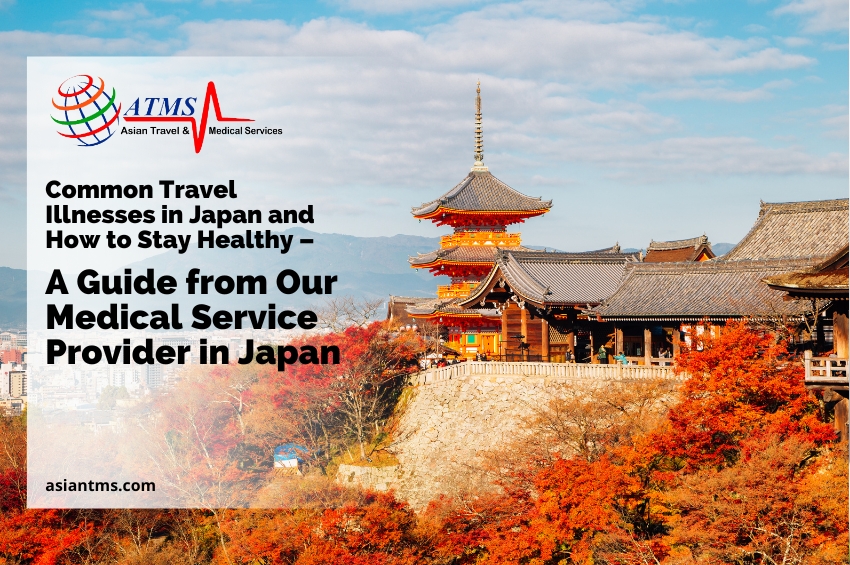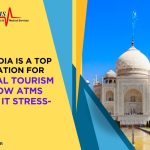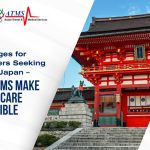
Traveling to Japan offers memorable cultural experiences, beautiful views, and world-famous cuisine. However, like any worldwide destination, it suggests its share of energy risks—especially for migrants unfamiliar with the local atmosphere, food, or feeling.
At Asian Travel and Medical Services (ATMS), we support travellers in Japan by contribution comprehensive healing assistance and health recommendations to keep you cautious and well during your trip.
This guide outlines ultimate common travel-connected illnesses in Japan, how to avoid them, and how our Medical Services provider in Japan can help if you contract illness during your stay.
1. Traveler’s Diarrhoea and Foodborne Illnesses
Although Japan has extremely strict food security standards, adventurers may still experience digestive issues due to dietary changes or unfamiliar elements.
Causes
- Sudden change in diet (e.g., extreme raw fish or fermented food consumption)
- Contaminated or undercooked drink, especially from road vendors
- Unfiltered or non-bottled water (rare, but likely in rural regions)
Symptoms
- Diarrhoea
- Abdominal cramping
- Nausea or vomiting
- Low-grade frenzy
Prevention Tips
- Eat freshly prepared food from reputable outlets.
- Choose bottled water in country areas or when doubtful about tap water.
- Wash hands before consuming and use a hand purifier frequently.
- Start with accompanying mild local dishes if you are ready for Japanese cuisine.
2. Seasonal Allergies
Japan experiences strong migratory pollen phases, particularly in spring and fall, that can surprise travellers not prepared for high irritant levels.
Common Allergens
- Cedar pollen (sugar) – peaks in spring
- Cypress pollen (hinoki) – peaks shortly after the tree
- Grass and ragweed in the summertime and autumn
Symptoms
- Sneezing
- Itchy or watery eyes
- Runny or congested nose
- Fatigue
Prevention Tips
- Wear a mask nature during extreme pollen seasons.
- Check regularly pollen forecasts (accessible in English online).
- Keep windows enclosed in your accommodation.
- Use air purifiers in lodging rooms or apartments.
3. Illnesses in the summer season
Summer in Japan is very hot and moist, particularly from June to September, increasing the risk of heat exhaustion and heatstroke.
Symptoms
- Dizziness or succumbing
- Excessive sweating trailed by no sweating
- Nausea or disgorging
- Rapid heartbeat
Prevention Tips
- Stay hydrated—always carry a used in travels.
- Avoid rustic activities all along peak sun hours (11 AM–3 PM).
- Wear light, breathable attire and a wide-brimmed hat.
- Use parasols and abating towels (available in convenience stores).
4. Cold, Flu, and COVID-19
Air-conditioned public transport and proximity in cities can spread respiratory illnesses. You can also contact our medical repatriation services provider in Japan for any kind of help.
Symptoms
- Fever and chills
- Sore neck
- Cough or sneezing
- Body aches
Prevention Tips
- Get immunized before travel (influenza and COVID-19 boosters).
- Wear masks in congested places (common practice in Japan).
- Carry hand sanitizer and purifier wipes.
- Avoid close contact with morbid individuals.
5. Insect Bites and Mosquito-Borne Illnesses
While Japan is not an extreme-risk zone for tropical afflictions, mosquitoes can carry Japanese type of encephalitis in some country areas, particularly in the summer.
At-Risk Areas
- Rural domains near edible grain paddies or forests
- Okinawa and the southern islands during the more enthusiastic months
Prevention Tips
- Apply insect repellent (holding DEET or Picaridin).
- Wear long sleeves and pants when tramping or camping.
- Sleep with screens or nets in the countryside fields.
- Ask your doctor about the Japanese encephalitis vaccine if staying in rural areas.
6. Altitude and Motion Sickness
Travelers heading to Mount Fuji or mountainous domains may experience mild altitude sickness. Japan’s winding roads and bullet trains can also prompt motion sickness in sensitive human beings.
Symptoms
- Headache
- Nausea or vertigo
- Light-headedness
- Difficulty sleeping at larger altitudes
Prevention Tips
- Ascend slowly when traveling to extreme-altitude regions.
- Drink water and avoid intoxication before hiking or crawling.
- Use motion sickness bands or a drug during train or limousine travel.
7. Jet Lag and Fatigue
Traveling across multiple opportunity zones to Japan can disrupt sleep patterns and cause jet lag, particularly for travellers from Europe or the Americas.
Symptoms
- Insomnia or early awakening
- Daytime drowsiness
- Poor aggregation
- Irritability or low emotion
Prevention Tips
- Adjust your sleep schedule a few days before winging.
- Get sunlight uncovered in the morning upon landing.
- Avoid caffeine and weighty meals before bedtime.
- Stay alive and hydrated during the departure.
How ATMS Supports You During Your Stay in Japan
Even with the best care, illness or harm can happen. That is where Asian Travel and Medical Services (ATMS) steps in with professional healing assistance and support tailor-made for international visitors.
Our Key Services in Japan
• 24/7 Emergency Medical Assistance
Our Medical Assistance provider in Japan will provide Immediate help and arrangements during healing crises.
• Hospital Navigation & Referrals
We guide you to the best choice hospital—either private or public—and help with check-in and paperwork.
• Language Interpretation
Our group provides English–Japanese healing interpretation to guarantee accurate communication accompanying doctors and staff.
• Medical Repatriation
If you want, we can arrange for a secure return to your home country under healing supervision.
• Teleconsultation
Access to able English-speaking doctors online for non-crisis issues.
More Read: Traveling to Japan for Treatment? Hire Our Reliable Medical Services Provider in Japan
Stay Safe, Stay Healthy with ATMS by Your Side
Japan is individual of the safest and uncluttered countries in the world—but travellers are not insensitive to the risks of illness or harm. Understanding the common travel sicknesses in Japan and how to prevent them can make your journey milder and more enjoyable.
And bear the unexpected occurs, ATMS is here to guarantee that you are cared for fast, professionally, and in a language you understand. Whether it is a minor cold, an allergic reaction, or emergency medical services in Japan, our team is continually just a phone call away.



